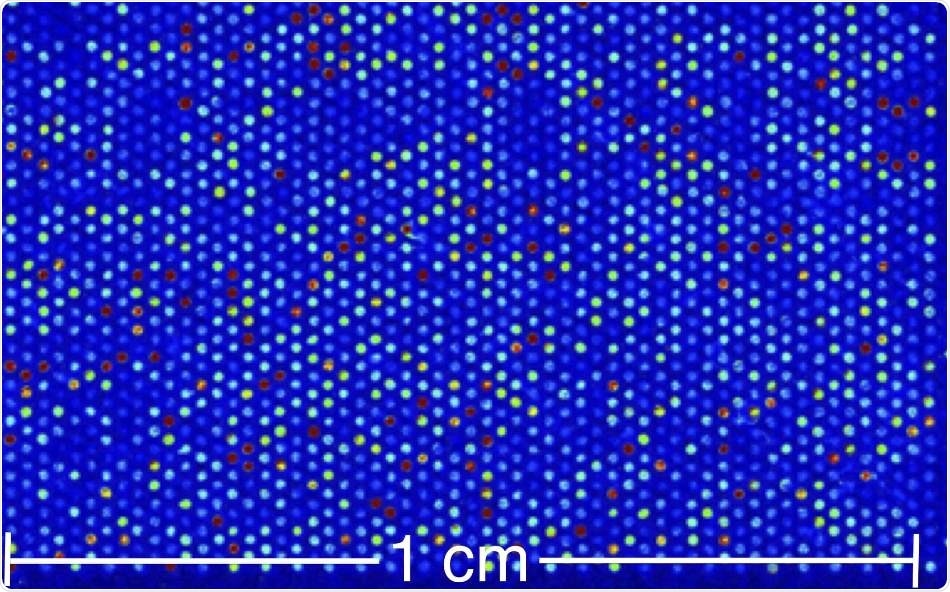Arrayjet Limited, the Scottish-based bio-printing technology specialist for the life sciences industry, has re-purposed its in-house antibody screening technology to create a population-scale diagnostic program that will help scientists better understand the behavior of the Covid-19 virus and further the rapidity of a global vaccination program.

A cancer antibody assay array showing the equivalent of about 2000 tests. This readout would look identical for COVID-19 screening
For this screening platform, an international collaborative partnership has been formed between Arrayjet and CDI Laboratories, a US-based proteomics company, located in Baltimore, Maryland and Mayaguez, Puerto Rico, which specialize in advancing proteomic research and development.
The team are using Arrayjet’s antibody screening technology ArrayPlex, and optimized reagents from CDI, to print thousands of droplets of synthetically made COVID-19 viral proteins on “biological microchips”. The microchips are then used to profile the immune responses of large groups of patients by accurately printing tiny droplets (0.0000001 ml) of their blood serum on top of the virus proteins. The platform provides an automated antibody profiling test using the serum of 18,000 patients per instrument every 24 hours.
As disease control and vaccine development measures continue apace across the globe, there is a requirement to understand and monitor large cohorts of test populations to identify which individuals are developing immunity. Our ability to mass screen 18000 patients, per instrument, every 24 hours with ArrayPlex will help provide datasets to epidemiologists and virologists to support their work understanding the complexities of virulence within the population.”
Iain McWilliam, CEO, Arrayjet
Whilst initial trials of the screening process have been successful, the collaborators now need to engage with other companies and research centers to screen infectious serum samples. This is a specialized diagnostic field and by joining efforts within the global life sciences community, Arrayjet and CDI will further advance the roll-out of their program.
Arrayjet’s technology ArrayPlex, can reveal if a person has an antibody signature in their blood which indicates that they have already been exposed to SARS-Cov-2.
ArrayPlex is a high-throughput library screening application which was originally developed to find immunotherapy drugs for cancer. For the COVID-19 trials, ArrayPlex has been adapted and repurposed to allow 18,000 patient serum samples in one ‘library’ to be screened against a small protein library from the COVID-19 virus, SARS -Cov-2. Each week the platform will generate 1 ¼ million separate datapoints describing the immune profiles of 126,000 patients. This high-volume capacity to process population-scale samples is what makes this technique a ground-breaking achievement in the quest against COVID-19.
Screening 18000 patients in a 24-hour period is a considerable achievement but it’s a figure that is readily manageable with this technology. We are dealing with an extremely virulent strain of coronavirus, so it is important that the process is highly automated to reduce the risks of technical teams coming into contact with infectious samples.”
Iain McWilliam
Coronaviruses tend to induce weak immune responses, which means secondary infections of COVID-19 remain a distinct possibility, and therefore managing COVID-19 is a long-term problem. Arrayjet and CDI, with their Arrayplex COVID-19 antibody screening solution, are offering an innovative contribution to these challenges.